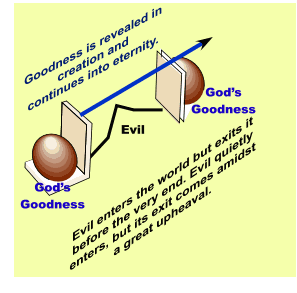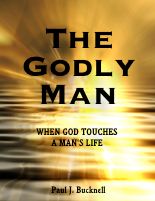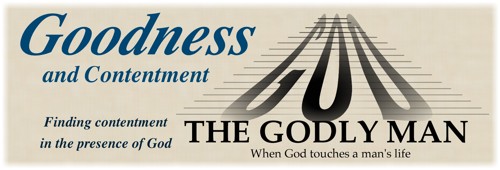
The Godly Man
When God touches a man's life
_________________________
Learn more about purchasing The Godly Man
Good and Evil: Their Nature & Discussion
Genesis 2
Paul J. Bucknell
God created only good things.
Discussing evil and good.
5 Statements to help us understand evil.
Summary of biblical principles of good and evil
 Many people are so caught up in this question of good and evil that they cannot see and appreciate God's goodness. Every time a question of this sort comes up, they cannot sit back and delight in God's glorious goodness. No. They are wondering why God did it this way. The questions are legitimate, but the permission to destroy any real appreciation of God's goodness is not.
Many people are so caught up in this question of good and evil that they cannot see and appreciate God's goodness. Every time a question of this sort comes up, they cannot sit back and delight in God's glorious goodness. No. They are wondering why God did it this way. The questions are legitimate, but the permission to destroy any real appreciation of God's goodness is not.
The word 'evil' is noticeably absent in the first chapter of Genesis. Only the word 'good' is used there in the creation account. The sense of evil is totally absent in the glorious creation of God. Evil enters in soon enough as an intruder, but first we find a unstained world. The Bible begins with glorious perfection and ends with it. We find the first heavens and earth was made with out sin and so the second one that will soon be made will share this unstained image.
God created only good things.
He did not create evil.(1). Because God is good, everything He would or could create would be good. Evil could not proceed from Him. That would be totally inconsistent from His nature. God's Spirit chased away evil spirits. Satan is called the 'evil' one (Matthew 13:19). 1 John 5:19 says,
We know that we are of God, and the whole world lies in the power of the evil one. (1 John 5:19).
Discussion of Evil
The theoretical discussions of how God associates with evil must never be allowed to obstruct the glory of God's goodness. The reason certain people are caught up in such theories is that they enter into the discussion doubting God's good nature and intention.  More than often, they have personally faced a past issue in which they came out questioning God's goodness. Because of their doubt, they are not very easily convinced. Arguments often arise, and they go off justified of their sinful doubts. I estimate I have heard 20 discussions on evil for every 1 on God's goodness. There is a lot of doubts out there!
More than often, they have personally faced a past issue in which they came out questioning God's goodness. Because of their doubt, they are not very easily convinced. Arguments often arise, and they go off justified of their sinful doubts. I estimate I have heard 20 discussions on evil for every 1 on God's goodness. There is a lot of doubts out there!
--- Purchase The Godly Man and its ten studies in easy epub or pdf format with study questions!
Any discussion of good and evil must be framed as it is in the Bible.
Only goodness is known in the beginning and the end. The book of Job is the same. Evil arises, but only after the beginning and before the end. Evil is sandwiched between wholly pure and good states. God's person or intention therefore is never questioned. We can only understand evil if we first understand and appreciate God's goodness.
The study of evil should be delayed until individuals have become well acquainted with God's goodness. Unless we come into the discussion by accepting God's goodness, all arguments will seem incomplete and not satisfy.
So where does evil fit into the scene?How are we to understand evil? How was evil introduced to the world? We are often confronted with questions like?
"If God's world is so good, then why is there so much evil?"
"If God is so good, then why did He allow evil to creep into it?"
This is a specific situation that helps clarify what we have been saying. The first time evil is used is in Genesis chapter 2. This is after creation rather than before. Each time it is introduced for the first five times, it is always used in the phrase "good and evil." (2)
#1 God oversees evil.
This is not only seen in the scene here following the creation account but brilliantly seen in Job's trials, Joseph's fall and rise, as well as in the greatest evil act possible – the crucifixion. We dare not leave doubt to crowd out our eyes of faith. What do we see in these verses from Genesis 2?
Ge 2:9 And out of the ground the LORD God caused to grow every tree that is pleasing to the sight and good for food; the tree of life also in the midst of the garden, and the tree of the knowledge of good and evil.
Ge 2:17 but from the tree of the knowledge of good and evil you shall not eat, for in the day that you eat from it you shall surely die.”
We see God's creation of a tree by which evil could come into the world. We are not told here where that evil originated from (3), but we know it works counter to God because it suggests to Eve that she ought to do something contrary to what He said.
We also should note that God warned man not to get involved in this evil one. It seems that the evil one was limited to what he could do in the garden. In a sense there was nothing he could tempt them with in places there was no law. He could only tempt them where there was a law or instruction. (4) God's warning was good but also became the window of opportunity for sin to creep in.
 #2 Good always overcomes evil.
#2 Good always overcomes evil.
With the perspective of the whole Bible, we can see that evil enters after God's goodness is displayed in creation and is eliminated before the end of the world. Evil might have stained the first creation, but God has established that He will make a new heavens and earth which will not be touched with evil. We might see some horrendous acts such as the sinless Jesus dying by the hands of murderers, but God is able and does bring about a greater good through the evil that is done.
And we know that God causes all things to work together for good to those who love God, to those who are called according to His purpose. (Romans 8:28).
#3 Evil is not a power equal to God
The ancient Persian religion Zoroastrianism explains the presence of evil by asserting that there are two coequal gods, one being light and the other darkness. They are both considered eternal. The creation account clearly rules this possibility out. The one God created all things. Evil came from within this creation but was not coexistent with the Creator.
God oversees evil. Good always overcomes evil. Evil is not a power equal to God. Evil is not equated with the creation. God is not responsible for evil.
#4 Evil is not equated with the creation.
Others try to explain the existence of evil by creating a false dualism which stated that spiritual things are good while matter is inherently evil. They suggest that matter hinders the full working of the spirit. Again, the creation account clearly testifies that all things were good that God made. Evil, however, is not the creation itself, but the wrong usage of what God made.
#5 God is not responsible for evil.
God did not create evil. He did make the tree of the knowledge of good and evil but not the evil. Otherwise any judgment against the evil one that we see later in the Book of Revelation doesn't make sense. Evil snuck into the garden in the form of the serpent and his temptation. The evil from the serpent induced people to do differently than what God has said.
Romans 5 fully shows the consequence of man's one evil act of disobedience. The whole race fell into a state of rebellion. Evil is defined by its contrariness to good. Good is defined as some quality or thing which is consistent with God's character and purpose.
If you must, go through the 476 uses of evil in the Bible and see that it is not God doing the evil. The confusion of evil with good is spoken against with very strong words. Isaiah 5:20 says,
Woe to those who call evil good, and good evil;
Who substitute darkness for light and light for darkness;
Who substitute bitter for sweet, and sweet for bitter!
Let's summarize some biblical principles set forth from the Genesis 1-2.
- God purposely and deliberately brought goodness into the world. God delights in goodness.
- Evil snuck into creation and tempted man to distrust God's goodness.
- God made man with a will to choose to do good or evil.(5)
- God created the test of man's allegiance by putting a certain prohibition from eating one tree in the garden.
- God guarded man from this tree by His command. Man had no reason to doubt God.
- The evil one through the serpent sought and gained man's obedience
=> Next
Relevant Topics on distasters and tragedies.
What does God think about tragedies?
What does God think about natural disasters?
Is it wrong to want judgment upon evil people?
What happens after death?
How can I find peace in such terrible times?
Why does God allow such things to happen?
How does a loving God allow such things as tragedies?
Crossing from anxious thoughts to peace
What are the 7 steps to seek forgiveness?
How does one deal with spirit of revenge?
How did David personally deal with a horrible evil event?
A new basic discipleship series has a free booklet explaining how we should biblically think of natural and unnatural disasters.
Next => Discovery of God's Goodness from Genesis 1:1 - 2:3
Notes
(1) Isaiah 45 boldly speaks about God creating darkness. Here the context is the Persian belief that there is both an eternal God of light and an eternal God of darkness. They believe they are both necessarily existence. These verses are saying that God, the LORD, is over all gods. God is fully in charge of darkness as well as light.5 ¶ “I am the LORD, and there is no other; Besides Me there is no God. I will gird you, though you have not known Me;
6 That men may know from the rising to the setting of the sun That there is no one besides Me. I am the LORD, and there is no other,
7 The One forming light and creating darkness, Causing well-being and creating calamity; I am the LORD who does all these.
The question still begs itself as to whether God created evil. Here is says that God created darkness and calamity. In some sense we must understand that God has His hand in these affairs. They are not there by accident. In all our discussion, we should in the end assert that God is not morally liable for man's evil. God did not impose it on us. By His creation of light, we find that He creates darkness. By creating what is good, evil comes to challenge it. God created Lucifer, but made it so that he could fall.
(2) The other three times 'good and evil are used in Genesis are below.
Ge 2:18 Then the LORD God said, "It is not good for the man to be alone; I will make him a helper suitable for him."
Ge 3:5 For God knows that in the day you eat from it your eyes will be opened, and you will be like God, knowing good and evil."
Ge 3:6 When the woman saw that the tree was good for food, and that it was a delight to the eyes, and that the tree was desirable to make one wise, she took from its fruit and ate; and she gave also to her husband with her, and he ate.
(3) Isaiah 14 and Ezekiel 28 help us understand where evil originated from. Lucifer, the greatest angel of all, thought himself equal with God. Because of his pride he was kicked out of heaven. He led a rebellion of other angels away from God. This is where evil spirits are. Satan is the same as the former angel called Lucifer, but now is the chief of demons.
(4) This is similar to the apostle's thought in Romans where he says there was no sin charged when there was no law. Sin is transgression of the law. "For until the Law sin was in the world; but sin is not imputed when there is no law. (Romans 5:13).
(5) Please don't confuse this with what is commonly called man's free will today. Adam before the fall had a free will. This 'free will' was restored to those who are in the second Adam Christ. A Christian is able to choose to follow God but fallen man is not free. Non-Christians's so-called free will is not free at all. Jesus calls him a slave of the evil one. He is trapped and cannot escape the clutches of the evil one. He only can do evil. He has no faith and everything he does is of unbelief and is sin.
info@foundationsforfreedom.net
Scriptures typically quoted from the New American Standard Bible unless noted:
(C) Copyright The Lockman Foundation 1988










